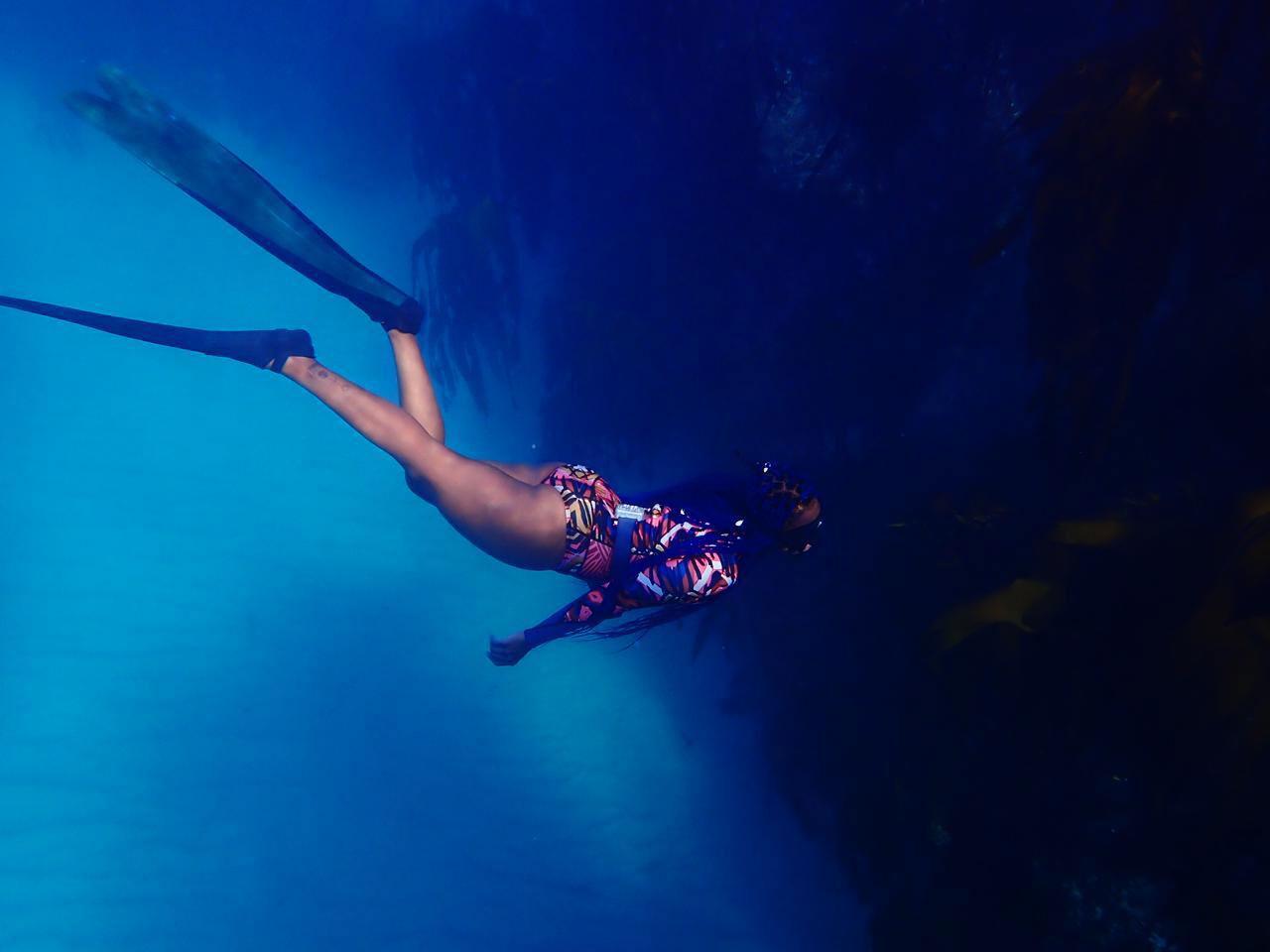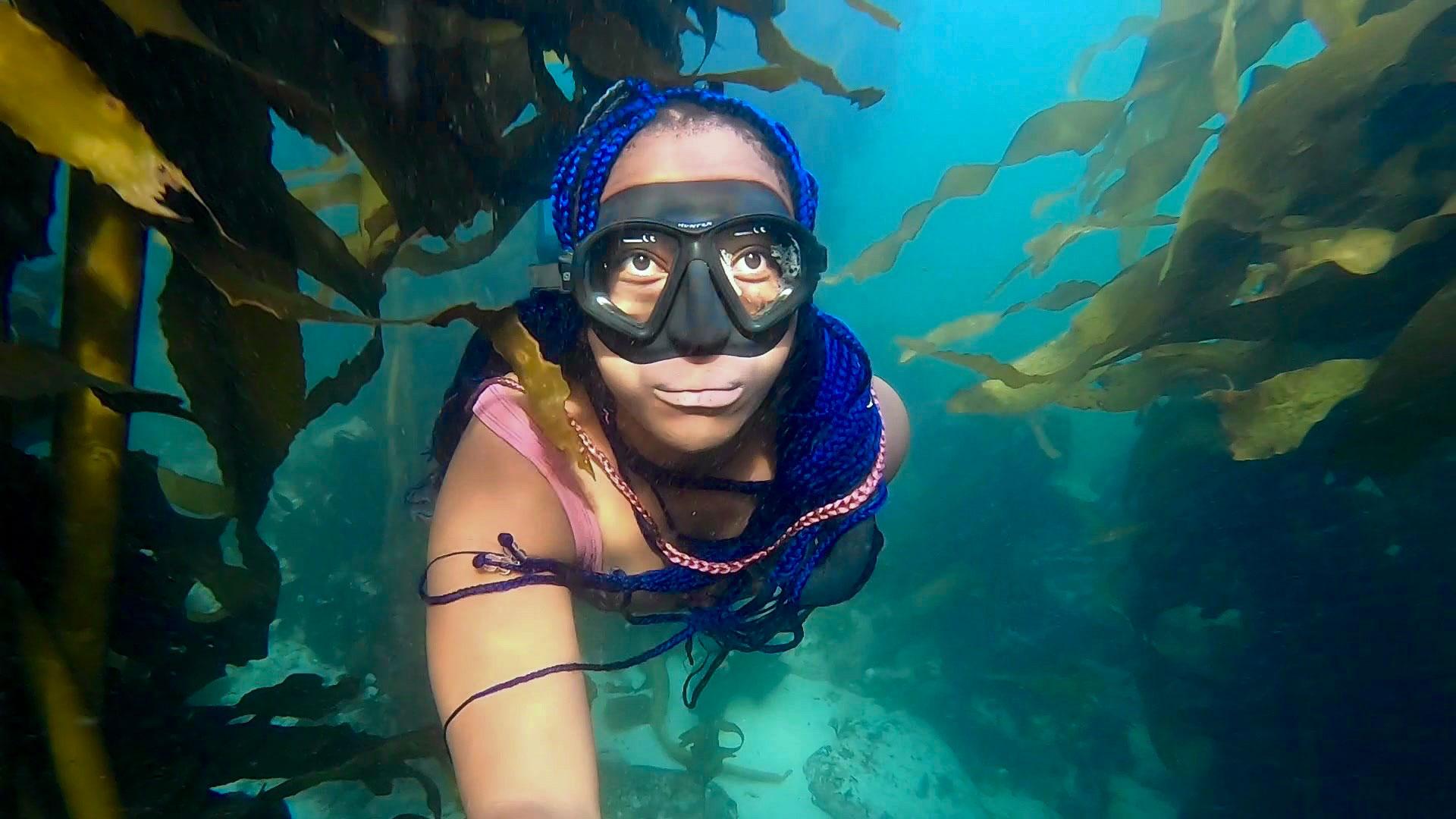Sodwana Bay in South Africa is one of the top diving sites in the world. Scuba divers and free divers encounter vibrant coral, schools of colorful fish, bottlenose dolphins, turtles, manta rays and sharks.
Another common sight off the waters of the bay is the “Black Mermaid” — Zandile Ndhlovu.
Ndhlovu is not a literal mermaid, but her explosion of blue hair and comfort in the waves reflect her mermaid persona.
Related: Mermaid diving is making a splash in China
“I definitely do identify very much as the ‘Black Mermaid’ in the physical sense,” Ndhlovu said. “When I was growing up, there [were] no mermaids that looked like me. Who would have thought that in my 30s I would officially become one.”
Ndhlovu is the first Black free-diving instructor in South Africa and the founder of the Black Mermaid Foundation, which aims to change the story of who belongs in the water by spreading awareness online and teaching school kids about the ocean.
“Free diving is when you hold your breath and you go exploring,” Ndhlovu said. “Scuba diving, you have a tank, you have air, you have time. With free diving, that tank is your lungs.”
Ndhlovu vividly recalls free diving off the coast of Sodwana Bay, in the KwaZulu-Natal province in the northwest of South Africa.
“I remember closing my eyes and diving in,” she said. “I dived with these beautiful sounds of whales. When I got to the bottom, I just remember looking around and wondering, ‘where are they?’ To listen to the song of whales as you dive down, it is wild. You have no breath, but you have eternity, you have infinity.”
Being the country’s first Black free-diving instructor has motivated Ndhlovu to encourage others to follow her example.
“For years here in South Africa, there was no access for Black and brown people to ocean spaces,” she said. “The best beaches — no Black people were allowed on them. Not to sit on them, not to get into the water.”
The history of apartheid and the systems of racial injustice that have perpetuated inequality in South Africa motivates Ndhlovu to encourage more people of color to engage with the water.
Ndhlovu said she is the first person in her family to be drawn to the water.
“My grandmother and I have always had a very difficult relationship around the fact that I’ve always taken up sports and activities that aren’t necessarily traditional.”
“My grandmother and I have always had a very difficult relationship around the fact that I’ve always taken up sports and activities that aren’t necessarily traditional,” she said.
Ndhlovu said through time, she and her grandmother have found a common understanding.
“It was the past December for the first time, she actually said to me, ‘You’ve been given eyes that many of us will never have. It’s amazing to witness how fearless you are,’” Ndhlovu said.

In the short time Ndhlovu has been diving off the coast of Sodwana Bay, she said she has noticed the environment change. For the first time, she’s seen, with more frequency, coral dying and turning white — an impact of warming ocean temperatures brought on by climate change.
Related: UNESCO: Great Barrier Reef should be listed as ‘in danger.’ Australia
She said she also often encounters plastic pollution while diving.
“How I see my work connecting back to conservation is that, essentially, you need to experience something before you can fall in love with it.”
“And what does it mean for us, to recognize that if we are not aware, we’re going to kill everything, you know?” she said. “How I see my work connecting back to conservation is that, essentially, you need to experience something before you can fall in love with it.”
Ndhlovu works in schools and speaks to students about the ocean, telling them about careers that are ocean facing, like marine biology and nature recreation.
Why schools? Because students “become the future that we hope for tomorrow,” she said.
“I want the little people to believe that these oceans are theirs too, because at the end of the day, they’re going to be the ones to protect them when we’re gone.”
The story you just read is accessible and free to all because thousands of listeners and readers contribute to our nonprofit newsroom. We go deep to bring you the human-centered international reporting that you know you can trust. To do this work and to do it well, we rely on the support of our listeners. If you appreciated our coverage this year, if there was a story that made you pause or a song that moved you, would you consider making a gift to sustain our work through 2024 and beyond?
